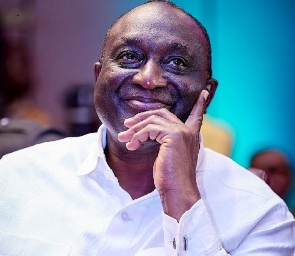 Alan Kyerematen, Independent Presidential Candidate
Alan Kyerematen, Independent Presidential Candidate
The National Democratic Congress (NDC) has been urged to take the resignation of former Trade and Industry Minister Alan Kwadwo Kyerematen from the New Patriotic Party as a wake-up call ahead of the 2024 polls.
In a statement to the Ghana News Agency, Abu Kasangbata, a former Deputy Minister of the Upper West Region, said the biggest opposition should consider Kyerematen’s departure as a “cautionary tale” and make the necessary adjustments in full preparation for victory in the crucial elections next year.
He said that although the resignation has sparked euphoria among some supporters and sympathisers, the party should be cautious and mindful of the uncertainty that lies ahead.
“Alan’s exit holds the potential to either make or break the NPP, but the NDC’s path to victory in 2024 must not be solely contingent upon it,” he said.
With the adoption of Ghana’s Fourth Republic Constitution in 1992, political pundits say the NDC has evolved as a political force in the nation, with its leaders consistently demonstrating strong leadership, political dominance, and a commitment to democratic principles.
However, Mr. Kasangbata stated that it was crucial to recognise that political fortunes could change rapidly and that the NDC cannot afford to rest on its laurels.
“Now, more than ever, the NDC must close its ranks and work harder than before,” he added. “The departure of Alan Kyerematen should not be the primary focus.”
He urged the rank and file of the party to focus its energy on addressing the concerns and needs of ordinary Ghanaians and harness its strength, which is rooted in the party’s time-tested ideals, to take over power in 2024.
“The NDC’s commitment to inclusivity, social justice, and economic development must shine through its policies and actions by listening to the voices of Ghanaians from all walks of life,” he said.
The NDC should also build a compelling vision for Ghana’s future that resonates with the electorate. The party’s firm commitment to democratic ideals must be the cornerstone of its campaign, emphasising transparency, probity, accountability, and good governance.
The former minister also enumerated striking achievements under former President Johan Dramani Mahama’s administration, citing Maham’s ambitious agenda to improve Ghana’s physical infrastructure.
These involved constructing and rehabilitating highways, schools, health facilities, and urban and rural access roads, making transportation more efficient and connecting isolated communities, facilitating economic growth, and improving quality of life.
He emphasised the significant strides made in improving access to quality healthcare services through establishing and upgrading hospitals and health facilities, coupled with the expansion of the National Health Insurance Scheme across the country.
Other initiatives also cited were improvements in agriculture by supporting farmers, boosting food production, and enhancing food security, including the provision of subsidised fertilisers, improved irrigation systems, and the introduction of mechanised farming methods.
“These measures not only increased agricultural productivity but also improved the livelihoods of countless rural families,” he added.
Mr Kasangbata also talked about improving and expanding access to quality education by constructing several new schools and renovating existing ones that guaranteed that every Ghanaian child had the opportunity to receive a quality education, paving the way for a brighter future.
Additionally, he cited how, under the Mahama administration, numerous social intervention programmes helped to alleviate poverty and support vulnerable segments of the population in line with UN sustainable development goals.
Therefore, he said these rare accomplishments and success stories should be the focal points for campaigning as the party seeks to reclaim power from the ruling NPP.
A recent National Opinion Poll on Governance and Elections conducted by pollster Mussa K. Dankwah showed that 47 percent of voters believe their standard of living has declined over the last 12 months.
Former president Mahama was in the lead for the general election in 2024, according to the poll, with 48.3 percent of the vote, followed by Dr. Mahamudu Bawumia with 28 percent, Alan Kwadwo Kyerematen with 11.3 percent, and other candidates garnering below 5 percent.
Despite Mahama’s commanding lead, Mr. Kasangbata said, “NDC and JDM must rekindle their political strategies towards the youth, academia, creative industry, media, market women, and civil society organisations.”
He also downplayed the ruling party’s insistence on “breaking the eight” mantra, citing its monumental record of massive debts, mounting inflation, a volatile currency, mounting youth unemployment, and an unbridled high cost of living.
He advised that while Alan Kyeremanteng’s exit may have stirred excitement, the NDC’s ultimate goal should transcend individual departures from their political camps, stressing that the NDC’s strength lies in its enduring values, unmatched leadership, and commitment to Ghanaians.